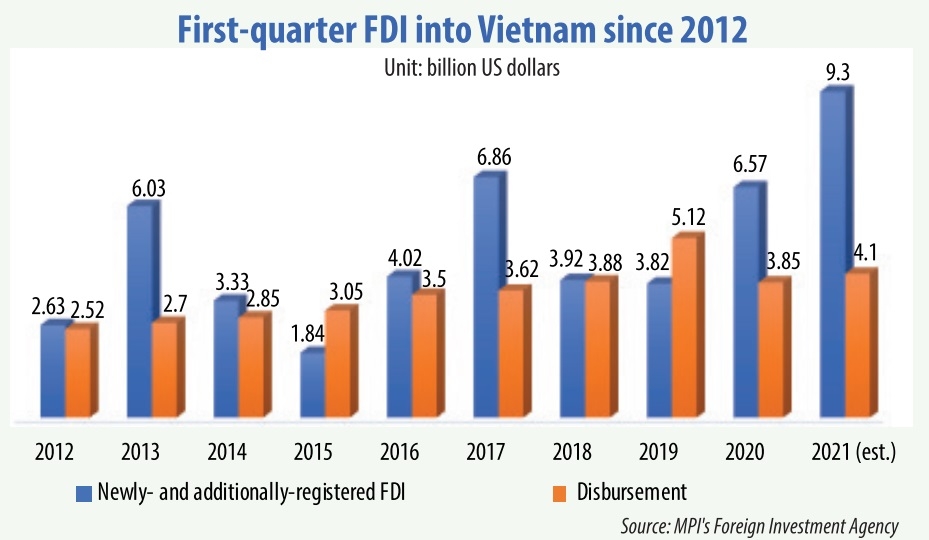Global kickstart to escalate investment
 |
The country witnessed an estimated 30-per-cent rise in registered capital in 2021’s first quarter, the best performance in the period for a decade (see box), driven by thermal power and high-tech investments.
Foreign direct investment (FDI) mobilisation in the first quarter has improved. According to the Foreign Investment Agency (FIA) under the Ministry of Planning and Investment (MPI), the total newly-registered and added capital, as well as investments into capital contributions and share purchases, amounted to $10.13 billion as of March 20, rising by 18.5 per cent on-year.
In addition, both newly-registered and additionally-registered capital in the first quarter increased. Of these, there are 234 newly-registered projects (down 69.1 per cent on-year) with $7.2 billion in the total investment (up 30.6 per cent on-year).
One major project in this period is the $1.3 billion O Mon II thermal power plant in the Mekong Delta city of Can Tho, developed through a joint venture between Vietnam Trading Engineering Construction JSC and Japan’s Marubeni Corporation.
Just over 160 projects have adjusted investment (decreasing by 31.8 per cent) with a total value of $1.6 billion (a rise of 97.4 per cent on-year), largely driven by the LG Display Haiphong project, which increased capital by $750 million.
Additionally, capital contributions and share purchases is the only part of FDI mobilisation to report an on-year decrease in the first three months with 734 instances (down 70.9 per cent) and the total investment of $805.3 million (down 58.8 per cent).
Last week, Le Thi Thu Hang, spokesperson for the Ministry of Foreign Affairs, said that the ministry is considering and proposing to adjust immigration provisions to suit with the current context, following the direction of Prime Minister Nguyen Xuan Phuc.
Hang emphasised the need to reopen soon, albeit in a safe manner. “The ministry has been working with other countries with high safety ratios to try and resume commercial routes,” Hang said.
China was the first country to implement an international travel health certification, to let vaccinated people travel more easily. In Southeast Asia, Thailand has been considering applying a vaccine visa to facilitate resumption of its vital tourism industry. European countries are also rushing ahead with developments of their own vaccine travel policies.
As of March 25, nearly 40,000 people across 19 cities and provinces had received their first dose of the Oxford/AstraZeneca COVID-19 vaccine. Nearly 118,000 doses of the vaccine arrived in Vietnam at first, and last week the country approved use of Russia’s Sputnik V vaccine while continuing to seek out diversification of other vaccines.
“These moves are very good news for people, and investors in particular, who are always looking for new business opportunities but have had to cancel all their plans over the past year,” said Do Nhat Hoang, general director of the FIA.
Hoang noted that strong performance in FDI inflows so far this year is a positive sign to ensure escalating numbers of projects and money coming in from overseas despite the border complexities. “Thanks to vaccination programmes commencing, the scale of newly and additionally-registered projects have increased compared to the same period last year, along with the improvement of disbursement capital year-by-year,” said Hoang.
What the stars mean:
★ Poor ★ ★ Promising ★★★ Good ★★★★ Very good ★★★★★ Exceptional
 Tag:
Tag:
Related Contents
Latest News
More News
- Hermes joins Long Thanh cargo terminal development (February 04, 2026 | 15:59)
- SCG enhances production and distribution in Vietnam (February 04, 2026 | 08:00)
- UNIVACCO strengthens Asia expansion with Vietnam facility (February 03, 2026 | 08:00)
- Cai Mep Ha Port project wins approval with $1.95bn investment (February 02, 2026 | 16:17)
- Repositioning Vietnam in Asia’s manufacturing race (February 02, 2026 | 16:00)
- Manufacturing growth remains solid in early 2026 (February 02, 2026 | 15:28)
- Navigating venture capital trends across the continent (February 02, 2026 | 14:00)
- Motivations to achieve high growth (February 02, 2026 | 11:00)
- Capacity and regulations among British areas of expertise in IFCs (February 02, 2026 | 09:09)
- Transition underway in German investment across Vietnam (February 02, 2026 | 08:00)






















 Mobile Version
Mobile Version